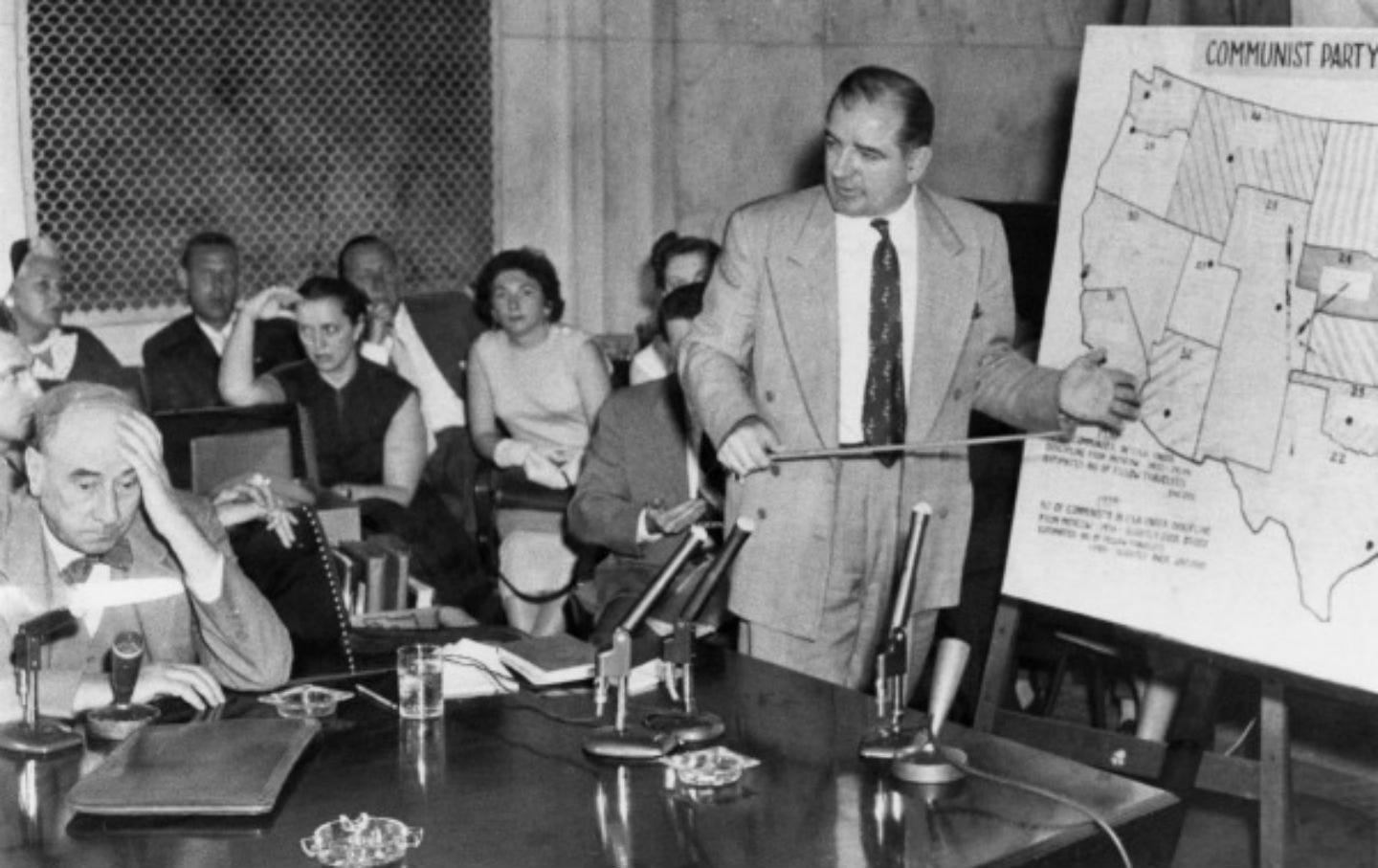This Day in Legal History: Army-McCarthy Hearings Begin
On April 22, 1954, the Army-McCarthy hearings began in Washington, D.C., marking a pivotal moment in American legal and political history. The televised proceedings, which stretched over two months, were convened to investigate conflicting accusations between Senator Joseph McCarthy and the U.S. Army. McCarthy claimed the Army was sheltering communists; the Army countered that McCarthy and his chief counsel, Roy Cohn, had improperly pressured military officials to give preferential treatment to a former McCarthy aide.
These hearings drew millions of viewers and brought McCarthy’s aggressive, often unsubstantiated allegations into public view. Under questioning, McCarthy’s bullying tactics and disregard for evidence became increasingly apparent. The most famous moment came when Army counsel Joseph Welch rebuked McCarthy with the now-historic line, “Have you no sense of decency, sir?”—a turning point in the hearings and in public perception of McCarthy.
As support for McCarthy dwindled, the hearings exposed the dangers of reckless accusations without due process, a central legal concern during the Red Scare. Later that year, the Senate formally censured McCarthy, effectively ending his political influence. The hearings stand as a cautionary tale about the abuse of investigatory powers and the erosion of civil liberties in times of national fear. They also highlight the essential role of transparency and accountability in American governance. The legacy of the Army-McCarthy hearings continues to inform debates over the balance between national security and individual rights.
Alphabet’s Google faces a major antitrust trial starting Monday in Washington, as the U.S. Department of Justice and 38 state attorneys general seek to break up its dominance in the search engine market. Central to the government's case is a proposal for Google to sell its Chrome browser and potentially even its Android operating system if competition isn't restored. Prosecutors argue that Google's exclusive agreements, like those paying billions to Apple and other companies to be the default search engine, have harmed rivals, including emerging AI firms like Perplexity AI and OpenAI.
Google insists the DOJ's demands are extreme and warns that ending these deals could harm browser makers like Mozilla and raise smartphone costs. U.S. District Judge Amit Mehta is presiding over the trial, expected to last three weeks. Google plans to appeal any unfavorable ruling and argues that its deals help fund free, open-source technology. The case follows a separate DOJ victory last week, where a judge found Google maintained an illegal monopoly in ad tech. The trial’s outcome could dramatically reshape how Americans access information online and influence future antitrust enforcement, with similar scrutiny already aimed at companies like Meta.
Google faces trial in US bid to end search monopoly | Reuters
The U.S. Supreme Court declined to hear Minnesota’s appeal defending its law that barred individuals under 21 from obtaining permits to carry handguns in public. This decision leaves in place a ruling from the 8th U.S. Circuit Court of Appeals that found the restriction unconstitutional under the Second Amendment. The case is one of many that have challenged age-based and other gun restrictions following the Supreme Court’s 2022 Bruen decision, which established that firearm regulations must align with the nation's historical traditions to be valid.
Gun rights groups, including the Minnesota Gun Owners Caucus and Firearms Policy Coalition, challenged the law, arguing it infringed on the rights of 18- to 20-year-olds. Minnesota defended the law as a modest safety measure, noting that youths already have access to guns under specific conditions, such as hunting or supervision. The 8th Circuit disagreed, saying the state failed to prove that young adults posed a sufficient threat or that the restriction had historical precedent.
While more than 30 states have similar age-related laws, Minnesota’s could no longer be enforced once the appeals process concluded. The case underscores how courts are interpreting and applying the Bruen test, which has reshaped the legal landscape for gun laws. Although the Supreme Court has upheld some modern firearm restrictions, it has consistently signaled that any such laws must fit within historical frameworks.
US Supreme Court won't save Minnesota age restriction on carrying guns | Reuters
In my column for Bloomberg Tax this week, I talk about the risk posed by the Department of Government Efficiency’s (DGE) access to taxpayer data. If the federal government wants more access to your tax data, it should have to meet a high bar—proving a clear need, protecting the information, and being transparent about how it's used. Right now, the DGE, spearheaded by Elon Musk, is pushing for expanded access to the IRS’s Integrated Data Retrieval System (IDRS), which holds deeply sensitive taxpayer records. The rationale? To root out fraud and streamline federal oversight. But noble intentions aren’t a substitute for safeguards—and as it stands, DGE hasn’t provided any clear guardrails for how it would handle this data.
We’ve seen how this can go wrong. In Sweden, the national tax agency is now facing a lawsuit for sharing taxpayer data with private companies, including marketers and data brokers. Sweden’s commitment to constitutional transparency has been used to justify these disclosures, even as they appear to violate Europe’s strict privacy laws. It’s a reminder that transparency can be weaponized, and privacy treated as an inconvenience. If that sounds extreme, just imagine your tax return fueling a marketing database in the name of government openness.
In the U.S., Section 6103 of the tax code makes unauthorized disclosure of taxpayer data a felony. DGE’s quest to tap into the IDRS raises serious questions about whether internal access could amount to disclosure, especially if it increases the risk of leaks, misuse, or political meddling. DGE already has access to some refund-related data, but it’s now seeking far more granular insight—without explaining what it will do with it, or how it will prevent abuse.
What Sweden’s case makes clear is that even the best intentions can lead to disastrous outcomes when privacy is not treated as sacrosanct. The U.S. should take that warning seriously. Taxpayer data is among the most sensitive information the government holds. Expanding access to it—especially by an agency as vaguely defined as DGE—should not happen without a fully transparent, purpose-limited, and accountable framework.
Until then, DGE should not be granted access to the IRS’s IDRS system or any individualized taxpayer information. The risks are too high, and the protections too flimsy.














Share this post